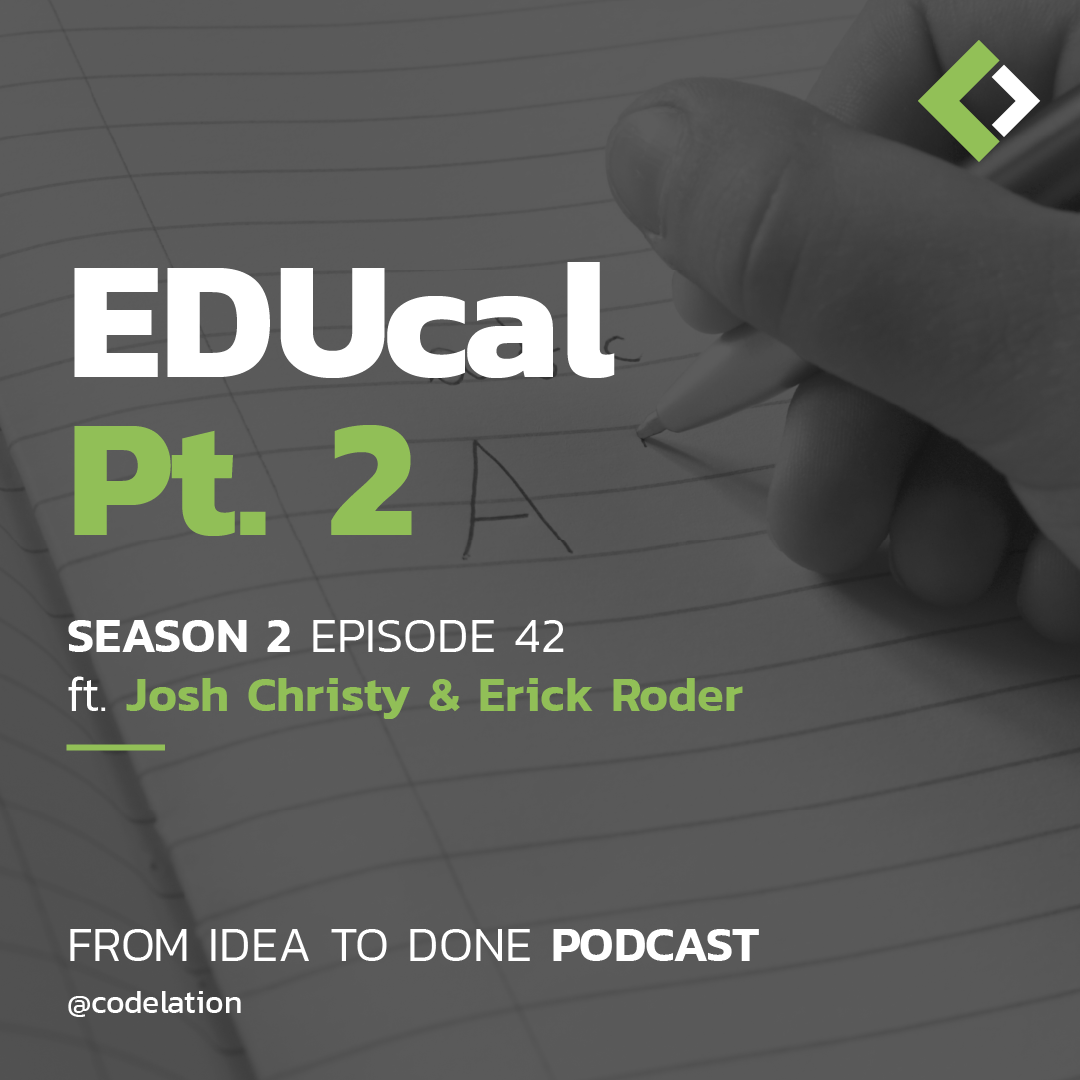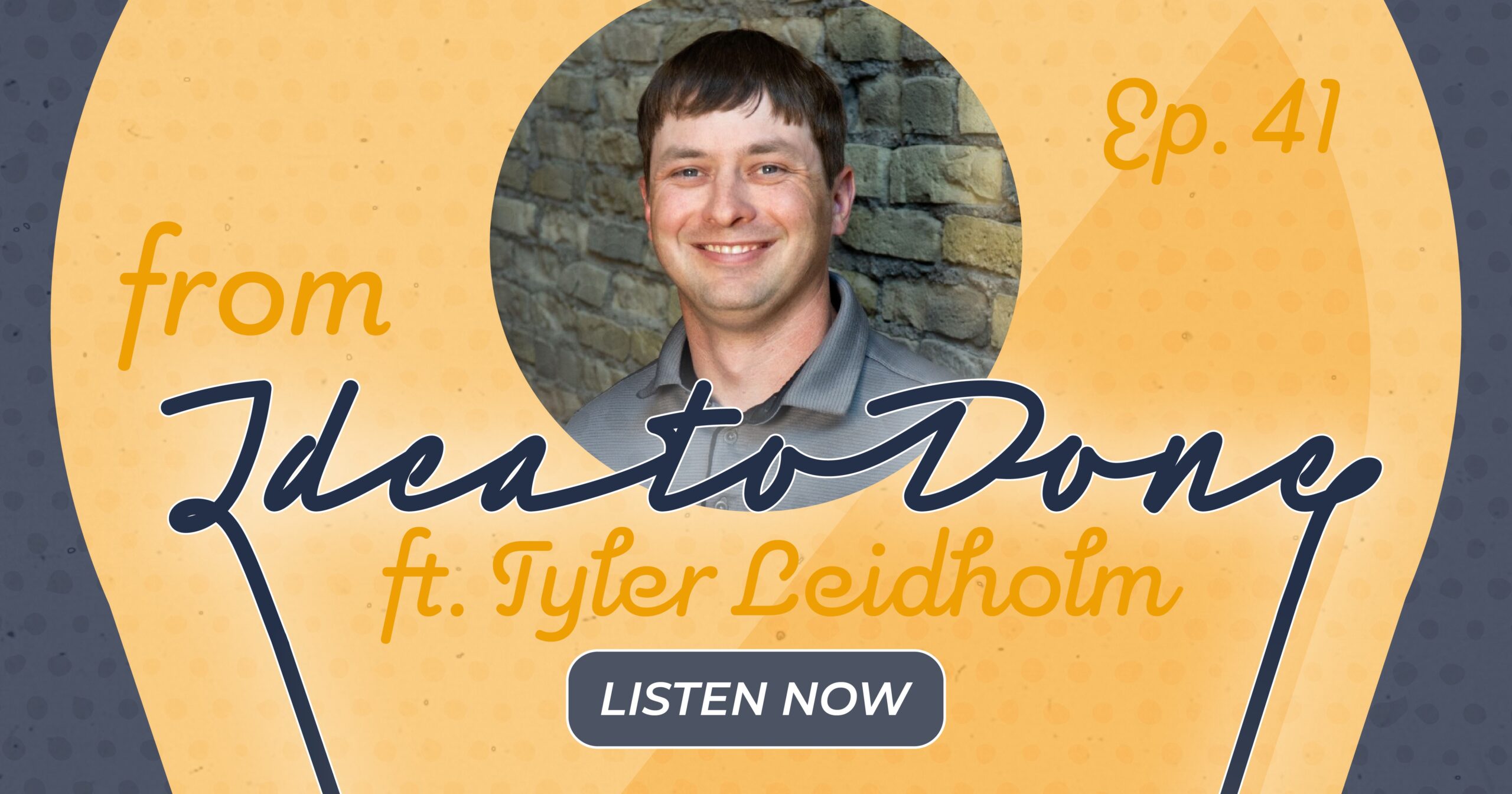EDUcal ft. Tyler Leidholm

When Should I Find An Investor?
October 6, 2020
EDUcal Pt. 2
October 20, 2020VO: Get ready for your semi-regular dose of random ideas from the guys at Codelation. We like to talk about big ideas companies that are winning, and those that aren't along with current events in our crazy world of software startups. So come along with Erick and Josh, who challenge you to think big, start small and turn your ideas into something on this episode of, from idea to done.
Josh: Hey everyone I'm Josh.
Erick: And I'm Erick.
: And today we're here with Tyler Leidholm from EduCal.
Tyler: Hey guys.
Erick: Thanks for taking some time to, uh, jump on a call with us really quick, and we're just gonna jump right into it. Can you talk us a little bit about EduCal? Let's talk about your startup. What, what does it, what does it do and what problem does it solve?
Tyler: Yeah, so EduCal is a K through 12 education collaboration tool that really allows the teachers to set expectations and communicate expectations with both students and parents, uh, through kindergarten or kindergarten through, um, all the way through 12th grade. Um, it's, it's really just a simple application that allows, um, teachers to post assignments, uh, set zoom links and meetings, and the times for those, and then allows the students to kind of just follow the planners for these teachers and, um, see what their week looks like in education. It kind of kind of breaks the mold of a traditional calendar where it's, uh, eight o'clock, nine o'clock, 10 o'clock, uh, that sort of a schedule and puts it more into a, what am I doing in geometry? What am I doing it in language arts? You know what, what's my schedule actually like today outside of just the, the time slots that you'd ordinarily get, and then also allows them to, to see assignments and, uh, notes and expectations and allows the teacher to kind of communicate with, uh, both the student and the parent, um, you know, maybe it's elementary and it's just a, Hey, your kid. Uh, his has a field trip tomorrow, remember to bring a sack lunch, um, or here's your spelling words for the week and all those things that get shoved in the bottoms of backpacks of elementary and even high school kids. You know, I don't know if high school has really used backpack as much anymore, but, uh, if they do, I'm sure they have some sort of crumpled up paper in the bottom of that. And we're just trying to become that crumpled up paper and in a digital form.
Erick: Oh, I guess that's, that's really unnecessary for me cause I never forgot anything as a student. So I think there's definitely a little bit of a like bridge needed to connect my, my like back in the nineties, Erick, with like take that agenda book and kind of connect that to actual teachers. And so that's a cool new idea. And especially in today's new distance learning world, we have to communicate better than ever really with students and teachers and parents. It's, it's just different, you know?
Tyler: Yeah. It's, it's definitely, you know, I've got, I've got kids, I got a third grader and a first grader it's um, it's interesting to see, you know, what, what each teacher brings and what they use. And, uh, some will use Facebook and some will use Google classroom and it's all over the board. And so we're really just trying to become that central place that you can use what you want to use, but for the parents and students just go to one central spot and look at what your expectations are, um, and just kind of try and make it really easy for everybody to know what's going on in the student's life. You know, I, I asked my kids what's going on for the day and it's always a, you know, I had fun and kickball or, you know, whatever, whatever it was, it's the highlights of their day of recess was great, but I never know, like, you know, what do you, what do you, what do you do in your spelling? You know, what they leave on the bus. And I don't know, I don't know what goes on in their day until they get home. So kind of gives you a little bit of a peek into what's going on during the day.
Josh: Yeah, I kind of in the same boat, have kids around the same age and um, I'm thank God that their mom understands what the heck's going on. Cause I I'm here to solve like math problems. And that's about my role in figuring this stuff out. I don't know what those sheets are with. It goes back in the folder, what doesn't so yeah. So Tyler, how'd you get, uh, how'd you end up, uh, working on a startup in the educational space?
Tyler: Uh, so I actually worked for the Fargo school district, um, a number of years ago and I worked for a gentleman named Steven Darrell and he was an ex math teacher and he created this, the basic idea for edgy Cal, um, 15 years ago. And he called it daily planner. So way back when they used to have to create these planters and then you'd have to turn them in to the office or whatever, to let them know that they'd done their, their plans for the week. So he created this digital form that really just, um, allowed teachers to fill it all out on mine. And then they're already attached to the students because there was some sort of a database back then now it's PowerSchool that ties everybody together and tells you who's in which class and just really he built it for himself. Well then the district office decided, all right, well, we really need this. As a, as a district, brought him on down to the district office, um, let him have, you know, intellectual property. They sign it over to him and everything. And then, um, so I I'd quit, uh, fast forward a few years, I quit at the Fargo school district worked, uh, started my own company and a couple of years ago, or about a year ago, I was talking to Steve and I still talk to him quite often. He's saying how much, you know, uh, how many different things that they really wanted to do with daily planner and how it's getting to be a lot of work to try and tie all these students to teachers. And, um, there's always some loophole and he spends a lot of time in the beginning of the year, just, you know, getting everybody set up and I'm like, well, why don't we make this into a SAS application?
Tyler: And just let the, let the students just follow their teacher, search, search your teacher, follow them and boom it's on them. Like it takes them two seconds versus taking you three weeks to set everybody up. Um, and let the teachers, you know, the teachers like your band teachers, they've got 15 different, uh, classes, according to some of these scheduling things, because they've got their wind instruments and all these other things, well, they want it, they just want to combine them down into band. Um, so why don't let the teacher just manage all that? So I said, all right, let's build this. So we built this for Fargo schools, um, to, to demo into it, to beta test for the year. And it was working really well. I mean, the teachers said we're using it. I mean, but it was just, it was just a beta.
Tyler: So we had, you know, just a, uh, 20% of the population maybe that were using it, something like that. Um, and then, you know, fast forward to, to COVID and, uh, it, it, it just blew up, you know, it became this, um, Fargo school set. I don't know how we're going to, you know, is there any way that edgy Cal can, can help us to, um, to really, uh, communicate with our students? I said, yeah, we can, we'll, we'll drop a zoom link on there and, you know, we'll figure this out. Well, it became much more robust than that. We tied into the API and we've got full zoom management and they can schedule for each one of their classes. And, um, and so it worked quite well, but in order to get on, uh, integration, full integration with zoom, uh, we really needed to, uh, be on their marketplace.
Tyler: And so we got on their marketplace and then, then things just went nuts. I mean, we, we had people from all over the world registering and using our application and, um, you know, in the free version, you know, it's all free at this, at that point because we hadn't really planned on monetizing it at all. And so they, they were using it as an individual teacher here and there, um, which, you know, what's great, but the real power behind the decal is when all of your teachers are using it. So the student can see all of your classes at once for high school. And so, um, we spent the summer kind of redoing things and revamping things and optimizing everything and, um, making it, uh, we added Google classroom, which is going to be launched soon and really just making it so that it's perfected for kind of the distance learning sort of aspect. And it's, we've got a lot of really positive feedback through it.
Erick: That's interesting. Cause like a lot of companies really struggled through the pandemic with a very different problem than you did have your, your product blowing up. Like what has that kind of changed? Your business model was changed because of the pandemic and how you are proceeding. Yeah, we really
Tyler: Didn't know what our business model was pre COVID. I mean, we kind of knew that we wanted to charge, um, just a small amount to cover costs and, and, and that sort of stuff, but we didn't really know. We kind of went back and forth. Are we going to charge for advertising? You know, what are we going to, how are we going to monetize this? And then once the pandemic hit, we're like, well, really the ones that need this, the ones that use it are the teachers. Um, they're the ones that bring value. So we're not charged us a minuscule amount per month teach teacher. Um, and then we'll create modules and monetize it that way and just make, or have the teachers or the districts pay per teacher for the value that we're adding. Not necessarily a lot of, a lot of these learning management systems, they, they ended up charging per student or per head count basically. Well, you might only use it for 20 or 10% of your head count, and that's not really what we want to do. We want this to be something that, uh, benefits a district and a teacher, and we want it to really, um, bring value to their, their daily, um, their daily classroom.
Josh: Cool. Do you guys have any, um, like public stats or anything that you're willing to share or just kinda how you guys have grown or,
Tyler: Yeah, I mean, back in, so back in February, March, we were getting probably were close to 200, 300 users a month, somewhere around there over the summer. Obviously that number died way down. Um, we were getting 10, 15, we're still getting some, uh, we have a couple just random. We had a, a coding academy in Palestine that, that jumped on board with us and they started using it. So we got to kind of those one-offs over the summer, um, a few summer school programs that, um, started using it a little bit, but now it's in schools picked up again, we're right around that probably 200, uh, new users a month, uh, area. And some of those are students, some of them are teachers we're getting, uh, about just in the last two weeks. We've, we've had 20 new classrooms that came on board. So, and that's, that's outside of, um, private schools, I guess as well for most schools has been there for awhile. So we don't, we don't come on them in our stats cause they kind of are just, uh, they've been there for a long time and been our test case and really been real supportive of, of, uh, of helping us out along the way. Awesome.
Josh: So, I mean, you've obviously had some, some unique challenges going through growth periods with COVID and everything else. I mean, taking this from really a ID or concept into a product is in market. Uh, what advice do you have for a startup that's really just at that ideation phase or trying to figure out what should they do? Something, what should they build? You know, what words of wisdom would you have for them?
Tyler: Yeah, I guess, you know, the biggest thing for me, um, in, in everything that I've done a small business wise is really just to, to create your idea, validate it, and then just concentrate on one idea at a time, try to keep yourself centralized and not go in too many different directions at once. Cause I've caught myself many times. Uh, just you pushing one idea forward, just an inch here and an inch there instead of really focusing on one pivotal part of your company or your new idea and just getting a success in one spot, because once you get one success, then that reenergizes you and allows you to really think of the next success and then the next success. Whereas if you're spreading yourself thin, you're not really ever reaching goals and you're not, um, not obtaining anything. Uh, so really it's, it's a good way to get burnt out, going into too many different directions. And so my biggest advice is always just concentrate on one thing and, um, just achieve small goals. Yeah, no,
Josh: That's, that's, that's great. Cause I, I see that with a lot of early stage entrepreneurs is they feel like they have to pursue all 10 things. Otherwise if they just focus on one thing, how are we ever going to get there?
Tyler: Yeah, exactly.
Erick: It's all just baby steps. And I like that advice. And um, did you, did you have anything like what's next for calorie? Do you want to highlight anything or promote anything? I'm the marketer. I want to give you a little platform to do any marketing for yourself.
Tyler: Yeah. I mean, we just, we're in two weeks here, we're launching, um, our full monetization. You can sign up as a district, uh, pay $2 per teacher per month. Um, if you add a teacher, you get $2 more, if you remove a teacher's $2 left, it's completely dynamic grows with your district. Um, and so we really just want, and we're adding Google classroom at that time too. Uh, so we really just want to, um, just promote the fact that, Hey, we're available. We, you know, anybody, that's got a school district that even as a parent, if you're saying, Hey, I have no idea what my expectations of my kids are. I've got one doing this. And one doing that, maybe educate would be a good thing to push to them and to your district and just ask them, Hey, can we at least try this out? I mean, even the free edition and we're open to giving you the paid edition for a trial period to, you know, we're, we're open to whatever we just wanna, we want to help all these districts right now. And, um, we've got expenses, so we have to charge something eventually, but, uh, we really just want to get out there.
Josh: Awesome. I appreciate you taking some time Tyler to jump on the podcast here and kind of share your, your story and your vision. So, uh, thanks for your time.
: Thank you both.
Sign up to receive email updates
Enter your name and email address below and I'll send you periodic updates about the podcast.
